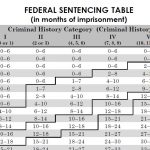Michigan Criminal Defense Attorney News
Jail and Prison Sentences Below Sentencing Guidelines are Now Possible Without a Deviation

Michigan Sentencing Guidelines Are Advisory, Not Mandatory
In 2015, the Michigan Supreme Court dramatically changed the sentencing process and opened the door to sentencing results that were impossible before that date. In the case of People v Lockridge, the Michigan Supreme Court decided that the statutory sentencing guidelines were unconstitutional. The Court found the guidelines unconstitutional because they allowed a judge to set an offender’s earliest parole eligibility date based on facts that were not proven to a jury beyond a reasonable doubt. The lawyers with LEWIS & DICKSTEIN, P.L.L.C. have advocated for this position for years!
To understand the Lockridge decision and the advantage to defendants represented by top criminal defense lawyers, it is helpful to understand how sentences were determined before July 29, 2015. The sentencing guidelines mandated that a number/points were assigned to factors related to a defendant’s criminal background (Prior Record Variable) and another set of factors relating to the particular offense and its severity (Offense Variables). The overall points were put into a sentencing grid to determine a recommended minimum sentence for a particular defendant. If a judge wanted to exceed the guideline range, they must put the reasons why on the record.
The reason for the sentencing guidelines was to promote uniform sentences across Michigan. The Michigan Supreme Court did not like that part of the sentencing consideration (the offense variable) was done with no input from a jury or agreement of the defendant. Thus, the basis for the Lockridge decision.
Negatives and Positives of Michigan’s Sentencing Guidelines Changes
The Guidelines were initially drafted to promote uniform criminal sentences. So, an offender in Traverse City would get roughly the same sentence as an offender in Detroit if they had a similar criminal history and committed a similar offense.
The imposition of uniform sentencing will be much more difficult after Lockridge because trial judges may now impose minimum sentences based on their personal beliefs. The Lockridge decision has given trial judges more power by granting them unfettered discretion to choose a defendant’s earliest parole date unconstrained by guidelines.
The negative impact of the change will be felt by those defendants represented by criminal defense lawyers who do not have the skill, tenacity, and zealousness to fight for reduced sentences and, instead, just capitulate to “guideline” sentences. The POSITIVE impact for individuals with top criminal defense lawyers is that sentences below guidelines are now far more likely with hard work, creative thinking, and passionate advocacy.

How a Top Defense Lawyer Achieves a Below Guidelines Sentence
In the realm of criminal defense, securing a below guidelines sentence can significantly alter the course of a defendant’s life, and this is where the prowess of a top defense lawyer truly shines. Such attorneys employ a multifaceted strategy that begins with a meticulous review of the case details, identifying mitigating factors or legal nuances that could influence sentencing. Their deep understanding of the law and a well-honed ability to negotiate enable them to present a compelling argument for leniency. By highlighting the defendant’s background, potential for rehabilitation, and any circumstances that may have contributed to the offense, they paint a comprehensive picture beyond the crime itself. This approach is tailored to resonate with the sentencing judge’s discretion, emphasizing factors like remorse, restitution, or the disproportionate impact of a guideline sentence on the defendant’s life. Furthermore, top defense lawyers leverage their knowledge of precedents and sentencing alternatives to advocate for sentences that focus on rehabilitation rather than punishment. Through persuasive argumentation and strategic negotiation, they work tirelessly to achieve a sentence that is fair and conducive to their client’s long-term well-being, demonstrating the profound difference an experienced defense attorney can make in the outcome of a case.
Court Appointed vs. Retained – Achieving a Below Guidelines Sentence
Navigating the complex waters of criminal defense often raises the question of whether to opt for a court-appointed attorney or to retain a private defense lawyer, especially when aiming for a below guidelines sentence. At LEWIS & DICKSTEIN, P.L.L.C., our retained criminal defense attorneys bring a distinct advantage to the table in this crucial aspect. Unlike court-appointed attorneys, who, despite their dedication, may be overburdened with heavy caseloads, our retained lawyers can devote the necessary time, resources, and personalized attention to each case. This focused approach allows for a deeper investigation into the case, developing a more tailored defense strategy and a proactive engagement with prosecutors and the court. Our team’s expertise and relentless advocacy are pivotal in highlighting mitigating factors, crafting compelling narratives around rehabilitation potential, and arguing effectively for sentencing alternatives. The dedication and nuanced understanding of the law our retained attorneys offer can significantly influence the pursuit of a below guidelines sentence, providing our clients a strategic advantage in securing a more favorable outcome. This distinction between court-appointed and retained legal representation underscores the importance of choosing a defense team that is fully invested in your case, ensuring that every avenue for a reduced sentence is meticulously explored and advocated for.

Sentencing is Often The Most Important Part of a Criminal Case
A well-prepared defense attorney is often the difference between prison/jail or just probation at a sentencing hearing. The attorneys at LEWIS & DICKSTEIN, P.L.L.C. have consistently defied the odds at achieving favorable sentences under the guidelines when they were mandatory. Now that the guidelines are only advisory, the criminal defense team with LEWIS & DICKSTEIN, P.L.L.C. will be able to achieve even more extraordinary sentence reductions for their clients.
No law firm or lawyer in Michigan works harder or smarter to achieve the best possible outcome. Judges no longer constrained by guidelines can listen and use discretion and compassion. With more discretion, even common sense can factor into sentencing. The lawyers at LEWIS & DICKSTEIN, P.L.L.C. have made it their professional goal to ensure that every person they represent is given the best possible defense available and the best possible sentencing result. If you are facing misdemeanor or felony criminal charges, it is essential that you contact the law firm of LEWIS & DICKSTEIN, P.L.L.C.
Call us today at (248) 263-6800 for a free consultation or complete an online Request for Assistance Form. We will contact you promptly and find a way to help you.













